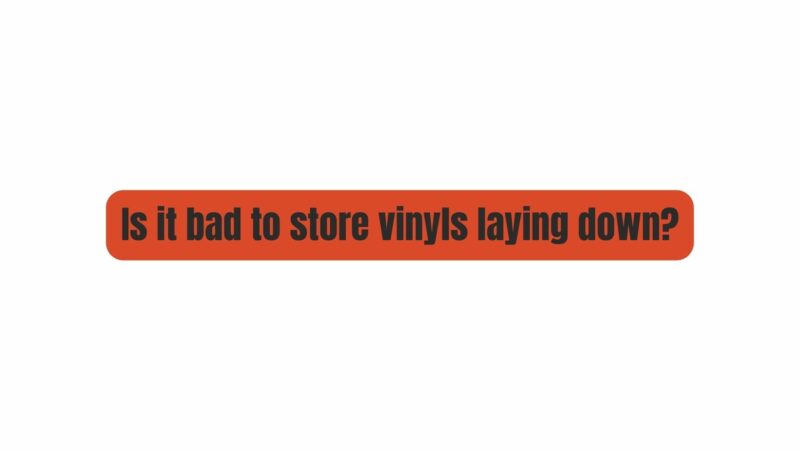Vinyl records are not just a medium for music; they’re a piece of history and artistry. As vinyl enthusiasts know, proper storage is crucial for preserving the quality and longevity of these beloved analog treasures. One common debate in the vinyl community revolves around the orientation of storage: is it bad to store vinyl records laying down? In this article, we’ll delve into this topic, dispel myths, and provide expert insights into how to store vinyl records correctly.
Understanding the Concerns
The notion that storing vinyl records laying down might be detrimental to them has circulated among collectors for years. The primary concerns often cited include warping, damage to the grooves, and potential sound quality degradation. Let’s address these concerns one by one.
Warping: The Common Fear
Warping is a dreaded issue among vinyl collectors. It occurs when the record loses its flat shape and develops a slight curvature, causing playback problems and aural imperfections. Many vinyl enthusiasts believe that storing records flat can prevent warping.
Damage to Grooves: The Myth
Another common belief is that storing records horizontally can result in damage to the grooves—the very heart of the record’s sound. Some people worry that prolonged contact with the inner sleeves or with other records can cause friction and abrasion, potentially harming the grooves.
Sound Quality Degradation: The Uncertainty
The ultimate concern for vinyl enthusiasts is sound quality. Will storing records laying down negatively affect the way they sound? While there’s no concrete evidence to support this, some argue that potential groove damage could lead to sound degradation.
Dispelling the Myths: Experts Weigh In
Let’s turn to experts and industry professionals to address these concerns and debunk the myths surrounding the storage of vinyl records laying down.
- Warping: Controlling Temperature and Humidity
Vinyl records are susceptible to warping when exposed to extreme temperature and humidity fluctuations. Storing records vertically or horizontally won’t make a significant difference if you’re maintaining the proper environmental conditions. Experts recommend storing your vinyl records in a cool, dry, and stable environment to prevent warping. Investing in quality outer sleeves for added protection is also advisable.
- Damage to Grooves: Proper Sleeves and Handling
While it’s theoretically possible for records to get damaged when they rub against each other or the inner sleeves during storage, this risk can be effectively mitigated with proper handling and the use of high-quality polyethylene or polypropylene inner sleeves. These sleeves are smooth and safe for your records, reducing the likelihood of friction-related damage. Additionally, placing records in a dust-free outer sleeve can further protect them during storage.
- Sound Quality Degradation: Proper Cleaning and Handling
The concern that storing records laying down might degrade sound quality is largely unsubstantiated. The most critical factors affecting sound quality are the condition of the record itself and the quality of your playback equipment. Regular cleaning, proper handling, and the use of anti-static brushes can maintain the condition of your records and preserve sound fidelity.
Storing Vinyl Records Vertically: The Preferred Method
While storing vinyl records laying down might not be as detrimental as some believe, the consensus among experts and seasoned collectors is that storing records vertically is the preferred and safest method.
Benefits of Vertical Storage:
- Ease of Access: Storing records upright allows for easy access and browsing. You can quickly locate and pull out the record you want to play.
- Weight Distribution: Vertical storage evenly distributes the weight of the records, reducing the risk of warping over time.
- Minimal Friction: Storing records vertically reduces the potential for friction-related damage between records and inner sleeves.
- Display Aesthetics: Many collectors prefer the aesthetic appeal of seeing the spines of their records lined up neatly on shelves.
Tips for Effective Vertical Storage:
- Use dedicated record storage shelving or crates designed to support the weight of vinyl records.
- Avoid overcrowding your storage space, as tight packing can lead to warping.
- Keep your records in their original outer sleeves or invest in high-quality polythene or polypropylene sleeves.
- Regularly inspect your collection for signs of wear, damage, or warping.
Conclusion: Proper Care Matters Most
In the debate of whether it’s bad to store vinyl records laying down, the key takeaway is that proper care and environmental conditions are paramount. While vertical storage is the preferred method among collectors, it’s not a strict rule that must be adhered to at all costs. The most critical factors for preserving the quality of your vinyl records are maintaining an appropriate environment, handling records with care, and using quality protective sleeves.
Ultimately, the love and appreciation of vinyl records extend beyond their orientation in storage. By following best practices for vinyl care, you can ensure that your cherished collection remains in excellent condition, delivering pristine sound quality for years to come.
In conclusion, storing vinyl records laying down is not inherently bad, but it’s not the recommended method due to potential risks. The focus should be on creating an optimal storage environment, handling records carefully, and using protective measures to safeguard your vinyl collection and ensure its longevity.

